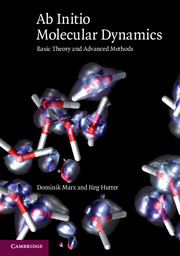11 - Outlook
Published online by Cambridge University Press: 28 January 2010
Summary
Standard ab initio molecular dynamics, which is based on ground state adiabatic dynamics using Kohn–Sham density functional theory in the microcanonical ensemble with classical nuclei, is by now, more than 20 years after its emergence [222], a well-established and mature simulation technology. There are many powerful and “easy-to-use” computer packages available that are able to perform ab initio molecular dynamics simulations (for instance ABINIT [2], CASTEP [234], CONQUEST [282], CPMD [696], CP2k [287], CP-PAW [288], DACAPO [303], FHI98md [421], NWChem [1069], ONETEP [1085], PINY [1153], PWscf [1172], SIESTA [1343], S/PHI/nX [1377], or VASP [1559] to name but a few), which are opening up new avenues for a broad range of applications. In academic research these codes are not only used by specialist groups as in the early to mid-1990s, but more and more in experimental groups in order to complement ongoing experiments – or even to allow for any meaningful physical interpretation of the measured data in the first place. In addition, ab initio simulations are becoming increasingly popular in industrial R&D as well. Analysis of databases such as those underlying Fig. 1.2 clearly shows that an increasing number of companies seem to be interested in this methodology. Researchers affiliated to Bayer, Corning, DSM, Dupont, Exxon, Ford, Hitachi, Hoechst, Kodak, NEC, Philips, Pirelli, Shell, Toyota, Xerox and others refer in their research publications to the Car–Parrinello paper [222] or use ab initio molecular dynamics in their work.
Information
- Type
- Chapter
- Information
- Ab Initio Molecular DynamicsBasic Theory and Advanced Methods, pp. 416 - 418Publisher: Cambridge University PressPrint publication year: 2009
